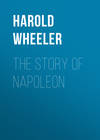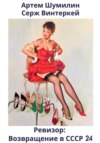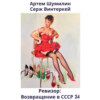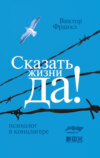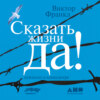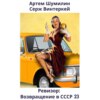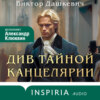Читать книгу: «The Story of Napoleon», страница 17
CHAPTER XXVIII
The Russian Campaign
(1812)
Poland was the point of concentration, and thither the Grand Army was marching. On the 11th June 1812, the Emperor arrived at Dantzig, which had been turned into a vast military depôt, and on the following morning proceeded to Königsberg, where further supplies were stored. He spent the whole day and night dictating despatches. Having twice communicated with the Czar to no effect, he was now irrevocably committed to the campaign. At Vilkowyski Napoleon took the opportunity to issue a bulletin to his troops couched in the old style which had proved so effectual in former campaigns. It is as follows:
“Soldiers! The second Polish war is begun. The first terminated at Friedland and at Tilsit. At Tilsit, Russia vowed an eternal alliance with France, and war with England. She now breaks her vows, and refuses to give any explanation of her strange conduct until the French eagles have repassed the Rhine and left our allies at her mercy.
“Fate drags her on—let her destinies be fulfilled. Does she imagine we are degenerated? Are we no longer the soldiers who fought at Austerlitz? We are placed between dishonour and war; our choice cannot be doubtful. Let us then march forward. Let us cross the Niemen, and carry the war into her own territory. This second Polish war will be as glorious for the French arms as the first; but the peace we shall conclude will carry with it its own guarantee, and will terminate the fatal influence which Russia, for fifty years past, has exercised in the affairs of Europe.”
Alexander’s proclamation to his troops, while less forceful than Napoleon’s, is more dignified and restrained. It was issued from his headquarters at Vilna, the capital of Lithuania, on the 25th June 1812, two days later than the one given above.
“We had long observed,” it runs, “on the part of the Emperor of the French, the most hostile proceedings towards Russia; but we always hoped to avert them by conciliatory and pacific measures. At length, experiencing a continued renewal of direct and evident aggression, notwithstanding our earnest desire to maintain peace, we were compelled to complete and to assemble our armies. But even then, we flattered ourselves that a reconciliation might take place while we remained on the frontiers of our empire, and, without violating one principle of peace, were prepared only to act in our own defence.... The Emperor of the French, by suddenly attacking our army at Kovno, has been the first to declare war. As nothing, therefore, can inspire him with those friendly sentiments which possessed our bosoms, we have no choice but to oppose our forces to those of the enemy, invoking the aid of the Almighty, the Witness and Defender of the truth. It is unnecessary for me to remind the generals, officers, and soldiers of their duty, to excite their valour; the blood of the brave Slavonians flows in their veins. Warriors! you defend your religion, your country, and your liberty. I am with you: God is against the aggressor.” Alexander promised the Governor of St Petersburg that he would not sheath his sword “so long as a single enemy remains in Russian territory.”
Practically the whole of the Grand Army—an effective force at the beginning of the campaign of 400,000 troops—crossed the river Niemen at different points, the troops with the Emperor near Kovno, those of Eugène and King Jerome at Pilony and Grodno respectively, the remainder under Macdonald at Tilsit. Prince Schwarzenberg with the Austrians crossed by the River Bug. Davout’s corps secured the honour of being first to enter Russian territory, and without much trouble they secured possession of the little town of Kovno, the point of concentration, reference to which is made in the Czar’s proclamation.
Alison has painted the scene for us in glowing colours. “The tent of the Emperor,” he writes, “was placed on an eminence three hundred paces from the bank, and as the sun rose he beheld the resplendent mass slowly descending to the bridges. The world had never seen so magnificent an array as lay before him; horse, foot, and cannon in the finest order, and in the highest state of equipment, incessantly issued from the forest, and wound down the paths which led to the river: the glittering of the arms, the splendour of the dress, the loud shouts of the men as they passed the Imperial station, inspired universal enthusiasm and seemed to afford a certain presage of success. The burning impatience of the conscripts; the calm assurance of the veteran soldiers; the confident ardour of the younger officers; the dubious presentiments of the older generals, filled every breast with thrilling emotion. The former were impatient for the campaign as the commencement of glory and fortune; the latter dreaded it as the termination of ease and opulence. None entered on it without anxiety and interest. No sinister presentiments were now visible on the countenance of the Emperor; the joy which he felt at the recommencement of war communicated a universal degree of animation. Two hundred thousand men, including forty thousand horse, of whom twelve thousand were cuirassiers, cased in glittering steel, passed the river that day in presence of the Emperor. Could the eye of prophecy have foreseen the thin and shattered remains of this immense host, which a few months afterwards were alone destined to regain the shore of the Niemen, the change would have appeared too dreadful for any human powers of destruction to have accomplished.”
The passage of the fourth Army Corps was not made under such happy auspices, but the men were cheered by the news that on the 28th June Napoleon had entered Vilna. This enabled them to shake off to some extent the depressing effects of the wet weather, and the presence of Eugène, Viceroy of Italy, and the dauntless Junot, both of whom personally superintended the construction of the bridge, did much to inspire enthusiasm. There was no enemy to contest them, and the crossing was effected in good order.
“Scarcely had we reached the opposite shore,” says Captain Eugène Labaume, who was with the expedition, “when we seemed to breathe a new air. However, the roads were dreadfully bad, the forests gloomy, and the villages completely deserted; but imagination, inflamed by a spirit of conquest, was enchanted with everything, and cherished illusions which were but too soon destroyed.
“In fact, our short stay at Pilony, in the midst of a tempestuous rain, was marked by such extraordinary disasters, that any man, without being superstitious, would have regarded them as the presage of future misfortunes. In this wretched village, the Viceroy himself had no house to shelter him; and we were heaped upon one another under wretched sheds, or else exposed to all the inclemencies of the weather. An extreme scarcity made us anticipate the horrors of famine. The rain fell in torrents, and overwhelmed both men and horses; the former escaped, but the badness of the roads completed the destruction of the latter. They were seen dropping by hundreds in the environs of Pilony; the road was covered with dead horses, overturned waggons and scattered baggage. It was in the month of July that we suffered thus from cold, and rain, and hunger. So many calamities excited within us sad forebodings of the future, and everyone began to dread the event of an enterprise, the commencement of which was so disastrous; but the sun reappeared on the horizon, the clouds dispersed, our fears were scattered with them, and at that moment we thought that the fine season would last for ever.”
The captain’s narrative is replete with similar instances, showing the almost complete failure of the commissariat on which so much care and anxiety had been bestowed, the treacherous nature of the weather, and the impossibility in so barren a country of putting into effect Napoleon’s maxim that war should support itself. Indeed, the truth was shown of another of the Emperor’s principles, that “an army marches on its stomach.” In the paragraph immediately following the one quoted above, Labaume says that on entering Kroni the soldiers again found the houses deserted, “which convinced us that the enemy, in order to ruin the country through which we were to pass, and deprive us of all the means of subsistence, had carried along with them the inhabitants and the cattle.” In a march of fifty miles no fewer than 10,000 horses succumbed.
But a greater difficulty than those we have enumerated soon presented itself. The Russian army, like a will-o’-the-wisp, enticed the French further and further from their base by a series of retreats which made it impossible for Napoleon to fall on the enemy with the fierce rapidity characteristic of his method of warfare. Alexander was playing a waiting game. When the ranks of the enemy were thinned by death, sickness, and desertion, when want and privation stalked hand in hand with the French armies as they painfully made their way along the snow-covered ruts—then would be the time to strike. The Czar could afford to wait, his antagonist could not; one was on the defensive, the other on the offensive, and many hundreds of miles from the capital of his unwieldy Empire. There was little or no opportunity for the soldiers to pay unwelcome attentions to the inhabitants of the villages through which they passed. The peasants had forsaken their wretched wooden shanties, the furniture of the houses of many of the nobles had been removed, making the places almost as cheerless as the frowning forests where their former owners had sought refuge.
At Vilna, which the Russians had evacuated, Napoleon experienced none of these troubles. The Poles, longing to restore the independence of their beloved country, regarded him as their potential liberator, delivering to him the keys of the town, donning their national costumes, and indulging in merry-making. The ancient capital of Lithuania awoke from her long sleep. Deputation after deputation waited on the Emperor, hungering to hear the words which would give them back their lost freedom. They were never uttered; he dare not break faith with his allies at this juncture. He made vague promises in order to stimulate their enthusiasm, set up a provisional government, and began to reorganise the provinces with his usual insight, but further than this he would not go. The Poles repaid him well by immediately ordering some 12,000 men to be placed at the Emperor’s disposal, and from first to last they furnished no fewer than 85,000 troops. To the Diet (Parliament) of Warsaw he admitted that he could sanction no movement which might endanger the peaceable possession of Austria’s Polish provinces, but he issued a fiery proclamation to those who were serving with the Russian colours. It runs:
“Poles! You are under Russian banners. It was permitted you to serve that Power while you had no longer a country of your own; but all that is now changed; Poland is created anew. You must fight for her complete re-establishment, and compel the Russians to acknowledge those rights of which you have been despoiled by injustice and usurpation. The General Confederation of Poland and Lithuania recalls every Pole from the Russian service. Generals of Poland, officers and soldiers, listen to the voice of your country; abandon the standard of your oppressors; hasten to range yourselves under the eagles of the Jagellons, the Casimirs, and the Sobieskis!4 Your country requires it of you; honour and religion equally command it.”
Note the subtle phrase, “Poland is created anew.” It is delightfully vague, meaning little, yet conveying much, and probably understood by many to promise the longed-for restoration.
Napoleon did not leave Vilna, where he had stopped much too long, until the 16th July, but the troops under King Jerome and Davout had been busy in an endeavour to cut off Prince Bagration from the main army under Barclay de Tolly. This measure was far from successful. Jerome was too slow in his movements, two combats ensued in which the Russians were successful, and Bagration made good his retreat to Bobruisk, Barclay falling back on Drissa, where a strongly entrenched camp was in course of construction, and later to Vitebsk. Napoleon was furious at his brother’s failure, saying, “It is impossible to manœuvre worse than he has done,” and superseding him by the more energetic Davout. With the intention of fighting Barclay, Napoleon pushed on to Glubokoie, only to find that the enemy had proceeded to Vitebsk, which in turn had been evacuated for Smolensk, where Bagration joined hands with Barclay on the 2nd August. Some advantages had been gained by Murat, Macdonald, and Oudinot, but the great opportunity of defeating the two armies separately had been lost, and the combined forces now numbered some 120,000 troops. The Emperor had again wasted time from various causes at Vitebsk, which centre several of his officers wished to make the winter-quarters of the army. He had already lost 100,000 men without accomplishing anything of importance, and as he himself admitted, “Russia is too powerful to yield without fighting: Alexander will not treat till a great battle has been fought.” The Emperor was for pushing on, and would brook no interference. “Why should we remain here eight months,” he asked his generals when the subject was under discussion, “when twenty days are sufficient to accomplish our purpose? Let us anticipate Winter and its reflections. We must strike soon and strongly, or we shall be in danger. We must be in Moscow in a month, or we shall never be there. Peace awaits us under its walls. Should Alexander still persist, I will treat with his nobles: Moscow hates St Petersburg; the effects of that jealousy are incalculable.”
Spurred on by the defeat of the advanced guard under Murat, the Emperor now decided to attack Smolensk with practically his entire army. According to Chambray this was now reduced, excluding various detachments, to some 194,000 men. On the 16th August Ney, with all his old fire and vigour, attempted to storm the citadel and was repulsed. Following their former plan, and fearing to be cut off from Moscow, part of the Russian army under Bagration began to retreat in the early hours of the following morning, Barclay remaining to defend the town with about 30,000 troops. After much heavy fighting the Emperor was in possession of the suburbs, but the losses on either side had been severe. Very soon the dense masses of smoke which arose from the walled city made it evident that to the terrors of shot and shell had been added that of fire. Flames burst out in all directions, the wooden roofs of the smaller houses quickly fell in, larger buildings caught alight and blazed away, fanned by the breeze. Within a few hours Smolensk was little more than a smouldering charnel-house. The conclusion of this dreadful incident is best told by an eye-witness, an officer in the French army.
“At one o’clock the ruins of the town were abandoned,” he says. “Our first grenadiers prepared to mount the breach at two o’clock in the morning, when, approaching without opposition, they discovered that the place was entirely evacuated. We took possession of it, and found on the walls many pieces of cannon, which the enemy could not take away.
“Never,” the narrator adds, “can you form an adequate idea of the dreadful scene which the interior of Smolensk presented to my view, and never during the whole course of my life can I forget it. Every street, every square, was covered with the bodies of the Russians, dead and dying, while the flames shed over them a horrible glare.”
Labaume thus continues the dreadful story begun by his friend:—
“The next day (August 19th) we entered Smolensk by the suburb built along the river. In every direction we marched over scattered ruins and dead bodies. Palaces yet burning offered to our sight only walls half destroyed by the flames, and, thick among the fragments were the blackened carcases of the wretched inhabitants whom the fire had consumed. The few houses that remained were completely filled by the soldiery, while at the doors stood the miserable proprietors without an asylum, deploring the death of their children, and the loss of their property. The churches alone afforded some consolation to the unhappy victims who had no other shelter. The cathedral, celebrated through Europe, and held in great veneration by the Russians, became the refuge of the unfortunate beings who had escaped the flames. In this church and round its altars, were to be seen whole families extended on the ground; in one place was an old man just expiring, and casting a look on the image of the saint whom he had all his life invoked; in another an infant whose feeble cry the mother, worn down with grief, was endeavouring to hush.... In the midst of this desolation, the passage of the army into the interior of the town formed a striking contrast. On one side was seen the abject submission of the conquered—on the other, the pride attendant upon victory; the former had lost their all—the latter, rich with spoil, and ignorant of defeat, marched proudly to the sound of warlike music, inspiring the unhappy remains of a vanquished population with mingled fear and admiration.”
Again the Emperor pondered, apparently undecided as to his next movement. Should he take up his winter quarters at Smolensk, as he had originally intended, or push on to Moscow? A great battle had been fought and yet the situation remained unchanged. He had merely taken a ruined city! Ney, Grouchy, and Murat, who had followed the retreating Russians, had but sorry tales to tell on the 19th, and the action near Valutino on that day was indecisive largely owing to the hesitation of Junot in coming to the aid of Ney. Defeat and disaster alone seemed to attend the efforts of the Grand Army. Still Napoleon hesitated. How could he, the virtual Master of Europe, the Conqueror who never failed, quietly lay aside his sword and by so doing tacitly admit failure? No, ten thousand times no; he would push towards Moscow though the heavens fall!
CHAPTER XXIX
The Triumphal Entry into Moscow—and after
(1812)
Grumbling was not confined to the French army in the campaign of 1812. The Russian troops said hard things of their generals which were not always justifiable, and the patriotic sentiments of the nobles suffered somewhat by the continued retreats, which were taken as evidence of weakness. As a concession to public opinion the much maligned Barclay was superseded by Kutusov, the Russian Commander-in-chief at Austerlitz, an old man approaching seventy years of age who had but recently returned from the war which his country had been waging with Turkey. He was to have an opportunity of showing his prowess within a few days of his joining the army, which now comprised nearly 104,000 men to the 125,000 or so of Napoleon. Severe fighting occurred on the 5th September, a redoubt near the village of Shevardino being taken and retaken three times by the advance guard before the Russians finally withdrew. So great was the bloodshed that when the Emperor afterwards asked where a certain battalion was, he received the reply, “In the redoubt, sire,” every individual having lost his life in the desperate assault. Over 1000 men on either side perished in defending or storming this position.
The enemy had fallen back on Borodino, a name which will be always associated with one of the most terrible battles ever fought on European soil. As the sun rose on the 7th September Napoleon exclaimed, “It is the sun of Austerlitz!” and shortly afterwards issued the following proclamation, which aroused some of the old enthusiasm amongst his troops but failed to invoke the plaudits of all. It is short and shows that the Emperor attached more importance to the battles of Vitebsk and Smolensk than the facts warranted:
“Soldiers! The battle is at hand which you have so long desired. Henceforth the victory depends on yourselves. It has become necessary, and will give you abundance; good winter quarters, and a speedy return to your country! Conduct yourselves as you did at Austerlitz, Friedland, Vitebsk, and Smolensk. Let the remotest posterity recount your actions on this day. Let your countrymen say of you all, ‘He was in that great battle under the walls of Moscow!’”
Firing began at six o’clock, and continued for twelve anxious hours. The contestants disputed the ground with such determination, each carrying and losing positions again and again, that at times it was difficult to say which army had the advantage. According to Labaume thirty of the Emperor’s generals were wounded, including Davout and Rapp, the former by being thrown from his horse as it fell dead, the latter by a ball which struck him on the hip. General Augustus de Caulaincourt, brother of the more celebrated Armand de Caulaincourt, Duke of Vicenza, after performing prodigies of valour in the Russian entrenchments, where the hardest fighting was done, was killed, as was General Montbrun but a little time before, while leading a similar attack. Prince Bagration afterwards died of the injuries he received, and many other Russian generals were more or less seriously wounded.
The key of the position, the Russian entrenched battery, with its terrible heap of dead and dying, was at last captured by the French. The officer commanding it was about to throw himself on his sword rather than surrender, but was prevented in the nick of time by the victors, who took him prisoner.
As Napoleon and his staff were surveying the field after the battle his horse stepped on a wounded man, whose groans attracted the rider’s attention. “It is only a Russian,” one of his attendants said, probably to allay Napoleon’s feelings rather than from want of sympathy. “After victory,” the Emperor retorted, “there are no enemies, but only men.” He was neither callous nor did he love war for its own sake. It was the result that pleased him, the humbling of the enemy, the addition of territory to the Empire, the driving of one more nail in England’s coffin. The maimed were ever his first care after battle. His besetting sin was an abnormal, and consequently unhealthy, ambition—the vice at which he had railed so much in his early days.
Napoleon failed to use his 20,000 Guards at Borodino, why is still a matter of conjecture. Some writers maintain that it would have been foolish for him to use up his last reserves, others hold that had he flung them into the battle he might have annihilated the Russian army and saved himself the agonies which followed. The reason he gave was, “At 800 leagues from Paris one must not risk one’s last reserve.”
Mr Hereford B. George, one of our greatest authorities on the invasion of Russia in 1812, states that Borodino was a butchery which cost the contestants not less than 70,000 men in killed and wounded. “No battle of modern times,” he says in summing up, “no encounter since the days before gunpowder, when the beaten side could be cut down ad libitum by the victors and quarter was seldom given, has witnessed such awful slaughter.... Whether it can be fairly called useless may be doubted, except to the nominal conqueror. Napoleon certainly deserves that title: the enemy had been dislodged from their position, and, as it proved, left the way open to Moscow. So much he might have attained by manœuvring; more he could not attain unless the courage of his enemies gave way. Without the brave men who fell at Borodino Napoleon could not possibly attempt any further offensive movement, when his occupation of Moscow led to no overtures for peace. Without them, he was substantially inferior in force when at length the inevitable retreat began. The Russian Te Deums, chanted for the victory that Kutusoff falsely claimed, were in truth only premature.”
Holy Moscow was to be the city of abundance, its entry the herald of a happier order of things. On the 14th September, as Napoleon rode forward with his troops, its domes and minarets burst upon his view. Ségur says that the soldiers shouted “Moscow! Moscow!” with the eagerness of sailors on sighting land after a long and tedious voyage. The city looked more like a mirage than the home of a quarter of a million people, more like the deserted city of an extinct race than a hive of humanity. General Sebastiani, who led the vanguard, knew the secret, and so did Murat. The Russians had arranged a hasty armistice in order to evacuate the place, leaving behind them only the riff-raff, the wounded, the aged, and the aliens.
No clang of bells greeted the Conqueror as he made his triumphal entry, no crowds of men and women craned their necks to get a glimpse of the mighty Emperor. Only undesirables welcomed him, the unrepentant prodigal son and the convict, released from prison by the governor before the last inhabitants fled in the wake of the retreating Russian army. There stood the mammoth Kremlin, the Acropolis of the ancient capital, surrounded by its massive walls; the gorgeous Cathedral of the Assumption in which the Czars were crowned; the Great Palace begun but six years before, and churches innumerable. Ikons but no worshippers, palaces but no courtiers! The Emperor took up his quarters in the Kremlin, appointing Mortier governor with strict instructions to prevent the troops from plundering. We shall see how the orders were obeyed later. Suddenly tongues of flame shot up from different quarters of the city, to be extinguished by the troops with great difficulty. Then a large public building was discovered to be alight. The flames began to spread with alarming and all-devouring rapidity. Soon a portion of the Kremlin itself was in imminent danger, and as there was much gunpowder stored in the fortress-palace the Emperor was forced to retire to a château some distance away, to return two days later when the work of destruction had somewhat abated. Labaume witnessed many terrible scenes, which he thus records with his usual vivacity:
“As I advanced towards the fire, the avenues were more obstructed by soldiers and beggars carrying off goods of every kind. The less precious articles were despised, and soon thrown away, and the streets were covered with merchandise of every description. I penetrated at length into the interior of the Exchange; but, alas! it was no more the building so renowned for its magnificence; it was rather a vast furnace, from every side of which the burning rafters were continually falling, and threatening us with instant destruction. I could still, however, proceed with some degree of safety under piazzas lined with warehouses which the soldiers had broken open; every chest was rifled, and the spoil exceeded their most sanguine expectations. No cry, no tumult was heard in this scene of horror; everyone found enough to satisfy his most ardent thirst for plunder. Nothing was heard but the crackling of flames, the noise of doors that were broken open, and occasionally a dreadful crash caused by the falling in of some vault. Cottons, muslins, and all the most costly productions of Europe and of Asia, were a prey to the flames. The cellars were filled with sugar, oil, and vitriol; these burning all at once in the subterraneous warehouses, sent forth torrents of flame through thick iron grates, and presented a dreadful spectacle. It was terrible and affecting; even the most hardened minds acknowledged the conviction that so great a calamity would, on some future day, call forth the vengeance of the Almighty upon the authors of such crimes.”
The fire began on the 14th September, and on the 16th it was raging worse than ever. “The most heart-rending scene which my imagination had ever conceived,” adds the narrator, “now presented itself to my eyes. A great part of the population of Moscow, terrified at our arrival, had concealed themselves in cellars or secret recesses of their houses. As the fire spread around, we saw them rushing in despair from their various asylums. They uttered no imprecation, they breathed no complaint; fear had rendered them dumb: and hastily snatching up their precious effects, they fled before the flames. Others, of greater sensibility, and actuated by the genuine feelings of nature, saved only their parents, or their infants, who were closely clasped in their arms. They were followed by their other children, running as fast as their little strength would permit, and with all the wildness of childish terror, vociferating the beloved name of mother. The old people, borne down by grief more than by age, had not sufficient power to follow their families, but expired near the houses in which they were born. The streets, the public places, and the churches were filled with these unhappy people, who, lying on the remains of their property, suffered even without a murmur. No cry, no complaint was heard. Both the conqueror and the conquered were equally hardened; the one by excess of fortune, the other by excess of misery.”
Many contemporary writers, including Labaume, assert that the conflagration was the deliberate work of patriotic citizens headed by Count Rostopchin, governor of Moscow. The latter certainly spoke of such a project, and according to the twenty-fifth bulletin of the Grand Army three hundred incendiaries provided with appliances for setting fire to the wooden houses were arrested and shot. As the Count afterwards denied the story it is difficult to say whether he actually carried into practice what he preached; it is quite possible that some of those who were left behind had actually more to do with the affair than the supposed prime mover. Professor Eugen Stschepkin, of the Imperial University of Odessa, says that “Moscow was burnt neither by Napoleon nor by Count Rostopchin. Probably, the fire was in part accidental, and due to plunderers, both Russian and French; in part the deliberate work of patriotically-minded inhabitants.” The conclusions of Mr Hereford B. George are: “On the face of the undoubted facts there is no adequate evidence that the burning of Moscow was deliberate, though there is of course no evidence that it was not.”

